Paper
For submission of articles or Working Papers to CEsA, please send an email to:
comunicacao@cesa.iseg.ulisboa.pt
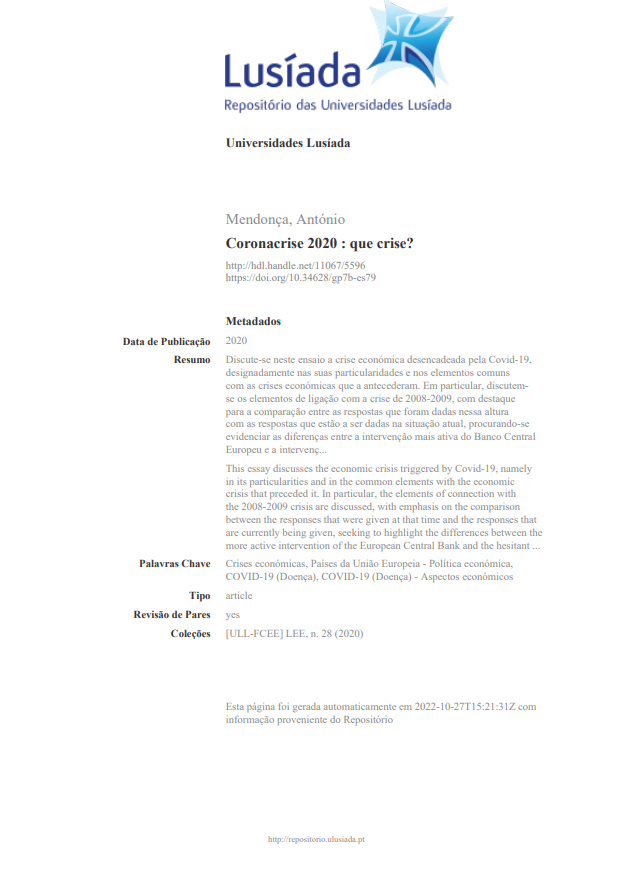
Coronacrise 2020: que crise?
Abstract:
The forecasts already published by national and international institutions on the impact of Covid-19 on economies confirm what had already been anticipated: deep falls in product and employment, fuelled by the joint reduction in consumption, investment and international trade, with consequent effects on deficits and public debt. Coronacrise 2020: que crise? discusses the economic crisis triggered by Covid-19, namely in its particularities and in the common elements with the economic crisis that preceded it. In particular, the elements of connection with the 2008-2009 crisis are discussed, with emphasis on the comparison between the responses that were given at that time and the responses that are currently being given, seeking to highlight the differences between the more active intervention of the European Central Bank and the hesitant and contradictory intervention of national and European institutions with responsibility for fiscal policy. We highlight the need for an economic recovery plan, with a European dimension and integrating national specificities, as well as the need for a change in attitude regarding the role of economic policy, that should favor a long-term expansionist perspective instead of the contractionary perspective which has conditioned European macroeconomic management in recent years.
Quotation:
Mendonça, A. (2020). “Coronacrise 2020: que crise?”. Lusíada. Economia & Empresa, nº 28 (2020), pp. 11-41. https://doi.org/10.34628/gp7b-es79
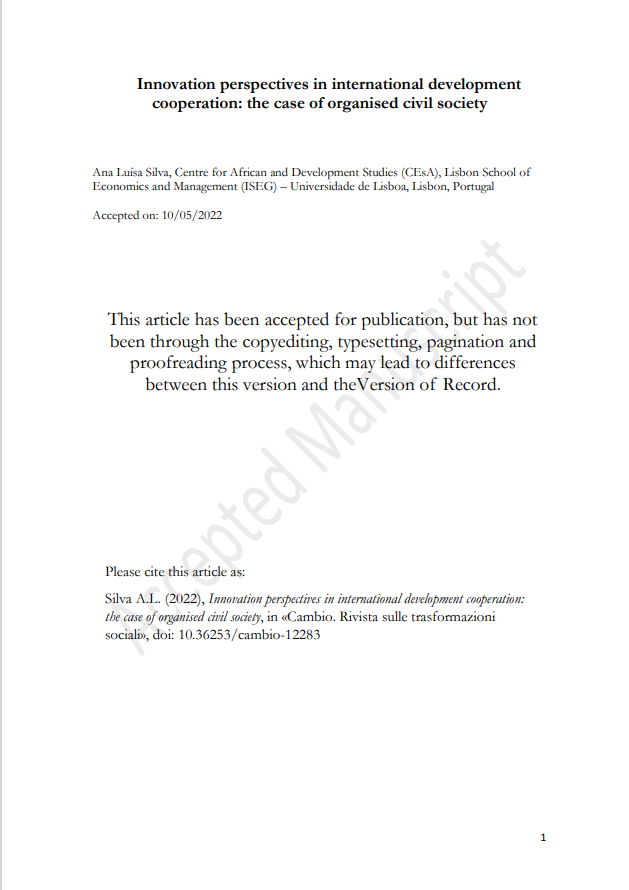
Innovation Perspectives in International Development Cooperation: The case of organised civil society
Abstract:
Non-governmental organisations (NGOs) are still in the side-lines of the emerging literature on innovation in international development cooperation, although the topic has been gaining prominence since the 2000s, accompanying the wider transformation of the development cooperation field. Innovation perspectives in international development cooperation: the case of organised civil society presents the results of a mixed methods research that involved a broad geographic sample of 20 NGO national co-ordinating bodies through an online survey and semi-structured interviews. The goal was to map and analyse innovation perspectives, motivations, and practices in these organisations, understand their relationship with mainstream views of innovation in the field and uncover their potential to promote inclusive innovation. Results suggest that these actors have potential to promote inclusive innovation practices in the field, since they approach innovation with social change as an end goal, as opposed to having an overly solutionist and problem-solving view of social innovation. The paper also highlights the key role of information and communications technologies, as well as digital tools, as both a reason to innovate and enablers of innovation in these organisations. Finally, the conclusion leaves questions open for further research on innovation in development NGOs.
Quotation:
Silva, A. L. (2022). Innovation perspectives in international development cooperation: the case of organised civil society. Cambio. Rivista Sulle Trasformazioni Sociali. https://doi.org/10.36253/cambio-12283
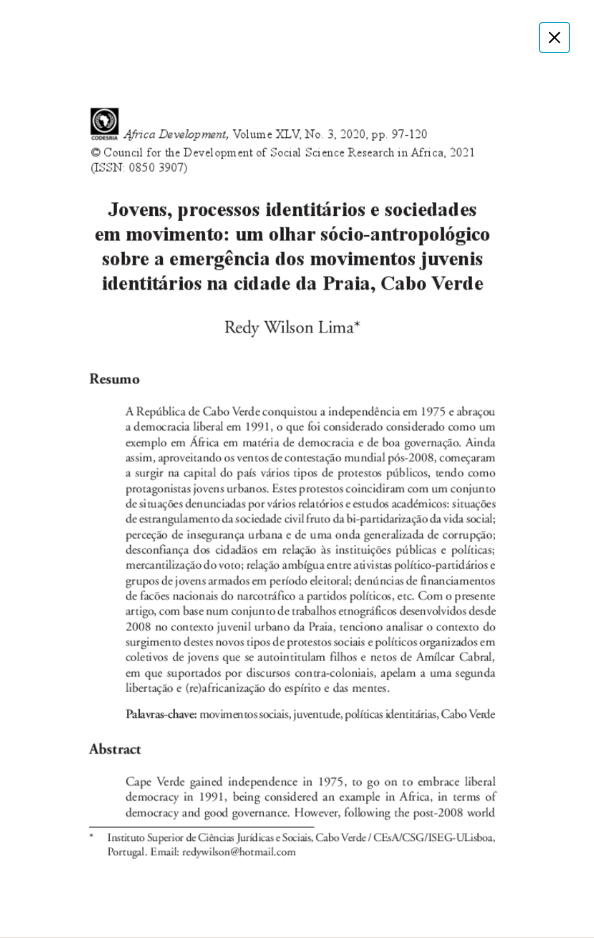
Jovens, processos identitários e sociedades em movimento
Abstract:
The Republic of Cape Verde gained independence in 1975 and embraced liberal democracy in 1991, which was regarded as an example in Africa of democracy and good governance. Still, taking advantage of the post-2008 global winds of protest, various types of public protests began to emerge in the country’s capital, with urban youth as the main protagonists. These protests coincided with a set of situations denounced by various reports and academic studies: situations of strangulation of civil society resulting from the bi-partisanship of social life; perception of urban insecurity and a generalized wave of corruption; citizens’ distrust of public and political institutions; commercialization of the vote; ambiguous relationship between political party activists and armed youth groups during elections; accusations of funding of political parties by national drug trafficking factions, etc. Jovens, processos identitários e sociedades em movimento: um olhar alternativo sobre os movimentos sociais urbanos emergentes na cidade da Praia – Cabo Verde, based on a set of ethnographic works developed since 2008 in the urban youth context of Praia, intends to analyse the context of the emergence of these new types of social and political protests organized in youth groups who call themselves sons and grandsons of Amílcar Cabral, supported by counter-colonial discourses, calling for a second liberation and (re)Africanization of the spirit and minds.
Quotation:
Lima, R.W. (2020). “Jovens, processos identitários e sociedades em movimento: um olhar alternativo sobre os movimentos sociais urbanos emergentes na cidade da Praia – Cabo Verde”. In: Jesus, L.S.B.; Barros, M.; Filice, R.C.G. (Orgs.), Tecendo redes antirracistas II: contracolonização e soberania intelectual. Fortaleza: Imprensa Universitária, p. 116-136.
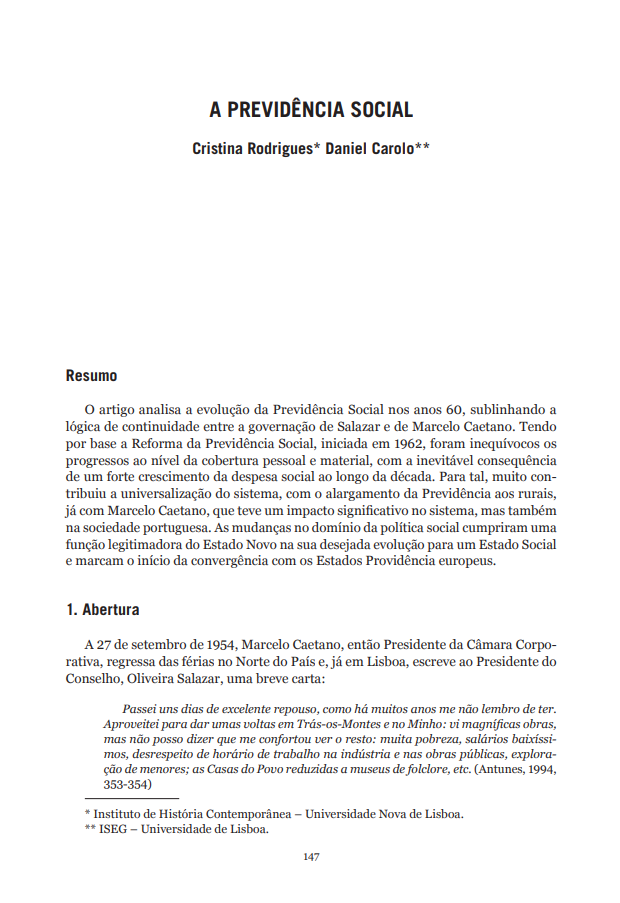
A Previdência Social
Abstract:
The 60’s corresponded to an unequivocal progress in the institutional evolution, material and personal coverage of the Social Welfare system, in which Law 2115, which instituted the 1962 Social Welfare Reform – which was in force as the Basic Law until 1984 – is absolutely central. Statistical data corroborate this statement, and even demonstrate the growth of social spending and the growing role of the State, also as a financer and not with a mere supplementary intervention. A Previdência Social analyses the evolution of Social Welfare in the 60’s, underlining the logic of continuity between Salazar’s and Marcelo Caetano’s government. Based on the Social Welfare Reform, initiated in 1962, progress in terms of personal and material coverage was unequivocal, with the inevitable consequence of a strong growth of social expenditure throughout the decade. To this end, the universalization of the system contributed a lot, with the widening of Welfare to rural areas, already under Marcelo Caetano, which had a significant impact on the system, but also on Portuguese society. The changes in the domain of social policy fulfilled a legitimizing function of the New State in its desired evolution towards a Social State and marked the beginning of convergence with the European Welfare States. We would like to thank Professors João Freire and Álvaro Garrido for reading the initial text of this article and for their relevant contributions to its final version.
Quotation:
“Rodrigues, Cristina & Carolo, Daniel (2020). “A Previdência Social”. In Brito, José Maria Brandão de Brito & Santos, Paula Borges (Coords.) Os Anos Sessenta em Portugal. Duas governações, diferentes políticas públicas. Porto: Afrontamento”
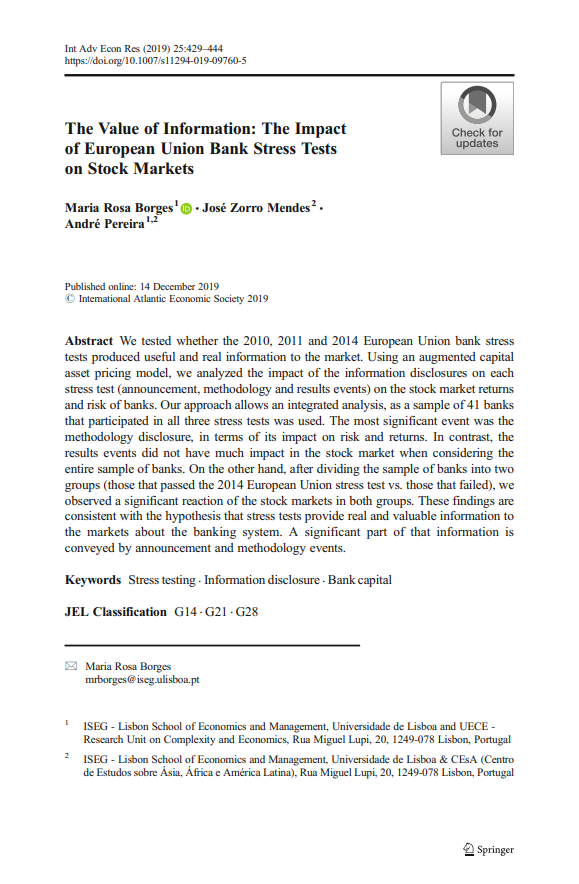
The Value of Information: The Impact of European Union Bank Stress Tests on Stock Markets
Abstract:
In The Value of Information: The Impact of European Union Banks Stress Tests on Stock Markets we tested whether the 2010, 2011 and 2014 European Union bank stress tests produced useful and real information to the market. Using an augmented capital asset pricing model, we analyzed the impact of the information disclosures on each stress test (announcement, methodology and results events) on the stock market returns and risk of banks. Our approach allows an integrated analysis, as a sample of 41 banks that participated in all three stress tests was used. The most significant event was the methodology disclosure, in terms of its impact on risk and returns. In contrast, the results events did not have much impact in the stock market when considering the entire sample of banks. On the other hand, after dividing the sample of banks into two groups (those that passed the 2014 European Union stress test vs. those that failed), we observed a significant reaction of the stock markets in both groups. These findings are consistent with the hypothesis that stress tests provide real and valuable information to the markets about the banking system. A significant part of that information is conveyed by announcement and methodology events
Quotation:
“Borges, M. R., Mendes, J. Z. and Pereira, A. (2019). “The Value of Information: The Impact of European Union Banks Stress Tests on Stock Markets”. International Advances in Economic Research, 25, 429-444. https://doi.org/10.1007/s11294-019-09760-5“
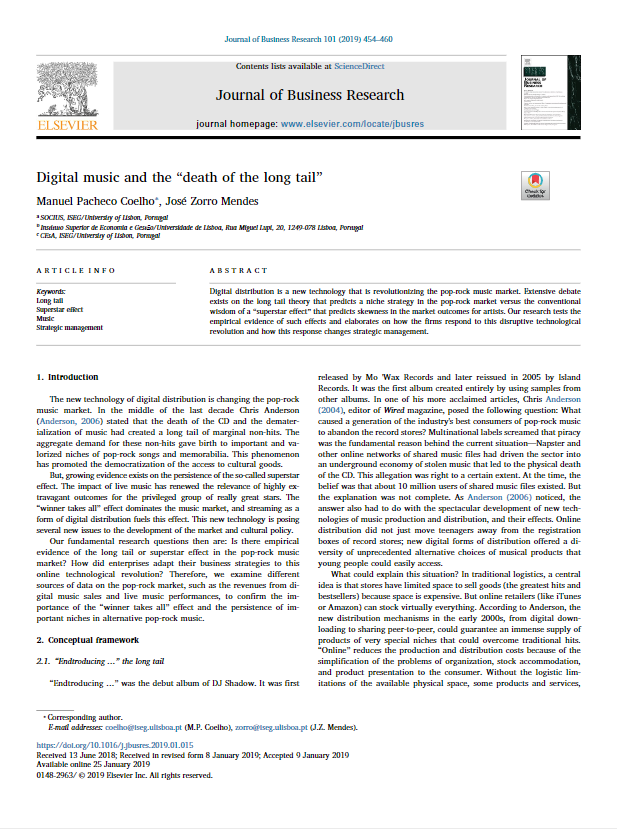
Digital music and the “death of the long tail”
Abstract:
The new technology of digital distribution is changing the pop-rock music market. In the middle of the last decade Chris Anderson (Anderson, 2006) stated that the death of the CD and the dematerialization of music had created a long tail of marginal non-hits. The aggregate demand for these non-hits gave birth to important and valorized niches of pop-rock songs and memorabilia. This phenomenon has promoted the democratization of the access to cultural goods. But, growing evidence exists on the persistence of the so-called superstar effect. The impact of live music has renewed the relevance of highly extravagant outcomes for the privileged group of really great stars. The “winner takes all” effect dominates the music market, and streaming as a form of digital distribution fuels this effect. This new technology is posing several new issues to the development of the market and cultural policy. Our fundamental research questions then are: Is there empirical evidence of the long tail or superstar effect in the pop-rock music market? How did enterprises adapt their business strategies to this online technological revolution? Therefore, in Digital music and the “death of the long tail”, we examine different sources of data on the pop-rock market, such as the revenues from digital music sales and live music performances, to confirm the importance of the “winner takes all” effect and the persistence of important niches in alternative pop-rock music.
Quotation:
“Coelho, M., Mendes, Z. (2019). “Digital music and the “death of the long tail”. Journal of Business Research, 101, 454-460. https://doi.org/10.1016/j.jbusres.2019.01.015“
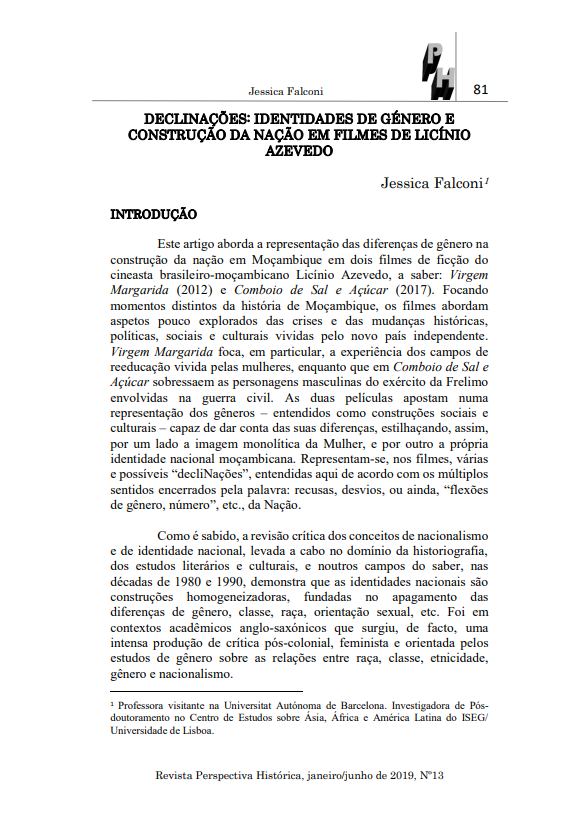
Declinações: Identidades de Género e Construção da Nação em Filmes de Licínio Azevedo
Abstract:
Declinações: Identidades de Género e Construção da Nação em Filmes de Licínio Azevedo addresses the representation of gender differences in nation building in Mozambique in two fiction films by Brazilian-Mozambican filmmaker Licínio Azevedo, namely: Virgem Margarida (2012) and Comboio de Sal e Açúcar (2017). Focusing on different moments in the history of Mozambique, the films address little explored aspects of the crises and the historical, political, social and cultural changes experienced by the new independent country. Virgem Margarida focuses, in particular, on the experience of the re-education camps lived by women, while in Comboio de Sal and Açúcar the male characters of the Frelimo army involved in the civil war stand out. The two films bet on a representation of the genders – understood as social and cultural constructions – able to account for their differences, thus shattering, on the one hand, the monolithic image of women, and on the other, the Mozambican national identity itself. The films represent several possible “decliNations”, understood here in accordance with the multiple meanings of the word: refusals, deviations, or even “flexions of gender, number”, etc., of the Nation.
Quotation:
Falconi, J. (2019). Declinações: Identidades de Género e Construção da Nação em Filmes de Licínio Azevedo. Perspectiva Histórica 13: 81-105. http://www.perspectivahistorica.com.br/revistas/1563933990.pdf“
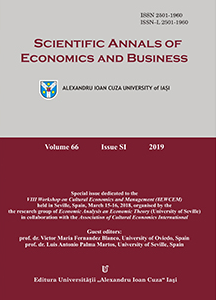
Cultural and creative entrepreneurs in financial crises: Sailing against the tide?
Abstract:
Cultural and creative entrepreneurs in financial crises: Sailing against the tide? Scientific Annals of Economics and Business focuses on a range of idiosyncrasies of cultural and creative entrepreneurs (CCEs) to study the resilience of CCEs in times of crisis (economic, financial and debt crisis). The demographics of CC firms (born and dead), trends and performance and the association between subsidies received and firm survival are analysed. It mainly analyses micro firms in a country where CCEs are particularly financially challenged, namely Portugal. It exploits the unique availability of micro accounting data at the private firm level over an 8-year period (2004-2011), which allows to include the effects of the last financial crisis, and to understand the evolution of the economic success criterion. The results obtained on the impact of subsidies on survival are interesting in both the CCE and the political perspectives, suggesting a positive impact of subsidies in periods of recession, and a negative impact of subsidies in periods of economic growth. Furthermore, CCE firms were found to be more dynamic than other firms in other sectors.
Quotation:
Fontainha, E., & Lazzaro, E. (2019). Cultural and creative entrepreneurs in financial crises: Sailing against the tide?. Scientific Annals of Economics and Business, 66(Special issue – dedicated to the VIII Wo), 73–89. https://doi.org/10.47743/saeb-2019-0022
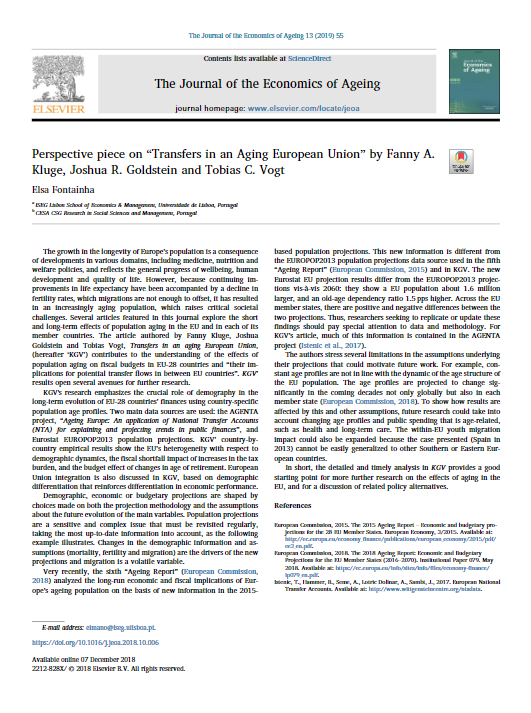
Perspective piece on “Transfers in an Aging European Union” by Fanny A. Kluge, Joshua R. Goldstein and Tobias C. Vogt
Abstract:
The growth in the longevity of Europe’s population is a consequence of developments in various fields, including medicine, nutrition and welfare policies, and reflects overall progress in well-being, human development and quality of life. However, as the continued improvement in life expectancy has been accompanied by a decline in fertility rates, which migration is not sufficient to compensate for, it has resulted in a growing ageing population, which raises critical societal challenges. Several articles presented in this journal explore the short and long-term effects of population ageing in the EU and in each of its member countries. The article written by Fanny Kluge, Joshua Goldstein and Tobias Vogt, Transfers in an ageing European Union, (hereafter “KGV”) contributes to understanding the effects of population ageing on the fiscal budgets of EU-28 countries and “its implications for potential transfer flows between EU countries”. The results of “KGV” open several avenues for further research. Elsa Fontainha comments on the work of Fanny A. Kluge, Joshua R. Goldstein and Tobias C. Vogt on population transfers in the European Union.
Quotation:
Fontainha, E. (2019). Perspective piece on “Transfers in an Ageing European Union” by Fanny A. Kluge, Joshua R. Goldstein and Tobias C. Vogt. Journal of the Economics of Ageing, 13, 55-55. https://doi.org/10.1016/j.jeoa.2018.10.006
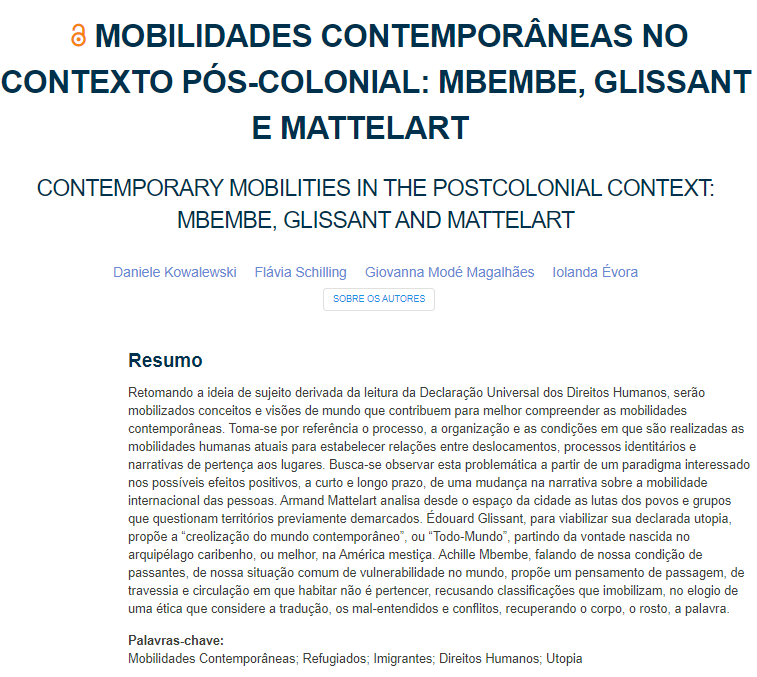
Mobilidades Contemporâneas no Contexto Pós-Colonial: Mbembe, Glissant e Mattelart
Abstract:
Taking up again the idea of subject derived from the reading of the Universal Declaration of Human Rights, concepts and worldviews will be mobilized that contribute to better understand contemporary mobilities. Reference is made to the process, the organization and the conditions in which current human mobilities are carried out to establish relationships between displacement, identity processes and narratives of belonging to places. In Mobilidades Contemporâneas no Contexto Pós-Colonial: Mbembe, Glissant e Mattelart we seek to observe this problematic from a paradigm interested in the possible positive effects, in the short and long term, of a change in the narrative on the international mobility of people. Armand Mattelart analyses, from the space of the city, the struggles of peoples and groups that question previously demarcated territories. To make his declared utopia viable, Édouard Glissant proposes the “creolisation of the contemporary world”, or the “All-World”, starting from the will born in the Caribbean archipelago, or rather, in mestizo America. Achille Mbembe, speaking of our condition of passers-by, of our common situation of vulnerability in the world, proposes a thought of passage, of crossing and circulation in which to inhabit is not to belong, refusing classifications that immobilise, in praise of an ethic that considers translation, misunderstandings and conflicts, recovering the body, the face, the word.
Quotation:
“Kowalewski, Daniele, Schilling, Flávia, Magalhães, Giovanna Modé, & Évora, Iolanda. (2019). Mobilidades Contemporâneas no Contexto Pós-Colonial: Mbembe, Glissant e Mattelart. Lua Nova: Revista de Cultura e Política, (108), 137-156. Epub November 28, 2019. https://doi.org/10.1590/0102-137156/108“





